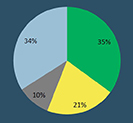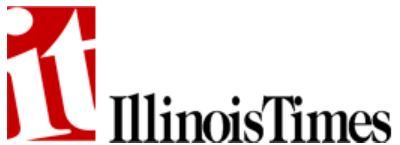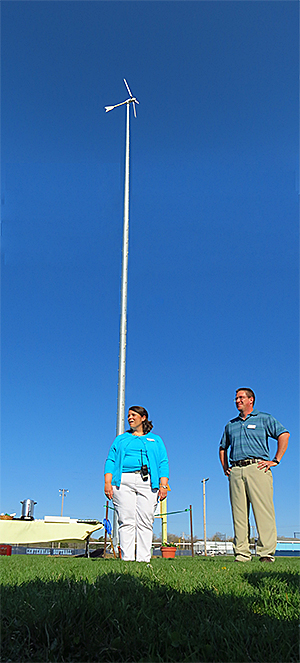 ISTC has posted recent case studies or fact sheets on its website developed by its Technical Assistance Group. They are also available on IDEALS, the University of Illinois’ Institutional repository. They illustrate victories by leading companies and organizations in E3 (Economy, Energy, and Environment), Illinois Governor’s Sustainability Award Winners, and zero waste. The organizations featured are: American Standard Circuits, Inc.; Champaign-Urbana Mass Transit District; J.L. Clark; The Label Printers Lewis & Clark Community College; The City of Urbana; and ISTC’s Champaign headquarters.
ISTC has posted recent case studies or fact sheets on its website developed by its Technical Assistance Group. They are also available on IDEALS, the University of Illinois’ Institutional repository. They illustrate victories by leading companies and organizations in E3 (Economy, Energy, and Environment), Illinois Governor’s Sustainability Award Winners, and zero waste. The organizations featured are: American Standard Circuits, Inc.; Champaign-Urbana Mass Transit District; J.L. Clark; The Label Printers Lewis & Clark Community College; The City of Urbana; and ISTC’s Champaign headquarters.
Midwest Biochar Conference Approaches
There is just one more week to register for the Second Midwest Biochar Conference. The Illinois Biochar Group, with the help of the Illinois Sustainable Technology Center and the U.S. Department of Agriculture as co-organizers, will present this look at the latest science in biochar Aug. 8 at Champaign’s Hilton Garden Inn. Register by Monday, July 28.
Springfield Newspaper Features People, Planet, Profit Approach at ISTC
 A lengthy article in the Springfield’s Illinois Times yesterday examined the practical, progressive approach to sustainable action at the Illinois Sustainable Technology Center. It is called the “Triple Bottom Line,” describing an approach to balance the interests of the planet, its people and a healthy economy — or, people, planet profits.
A lengthy article in the Springfield’s Illinois Times yesterday examined the practical, progressive approach to sustainable action at the Illinois Sustainable Technology Center. It is called the “Triple Bottom Line,” describing an approach to balance the interests of the planet, its people and a healthy economy — or, people, planet profits.
In the article, reporter Patrick Yeagle quotes ISTC Director Kevin O’Brien saying “We don’t want Illinois businesses to prioritize profit at the expense of the planet; that’s Texas,” O’Brien said. “Likewise, we don’t want them to forgo profit in the name of saving the planet; that’s California.”
The Times reviews some of the current research and technical assistance efforts of the Center including: making a variety of liquid fuels from plastics; supercapacitors from biochar; low-energy desalinization technology; combatting emerging pollutants; detecting water infrastructure leaks, and; shrinking waste streams to landfills.
To read the full article visit the Time’s website at http://illinoistimes.com/article-14158-science-to-solve-tomorrow%25E2%2580%2599s-problems.html
Tiny Plastic Pollutants Banned in Illinois
 Why did Illinois pull the plug on the use of plastic microbeads as exfoliants? ISTC’s B.K. Sharma and Nancy Holm offer insights on the trouble with microbeads in the “A Minute With…” feature on the U of I website.
Why did Illinois pull the plug on the use of plastic microbeads as exfoliants? ISTC’s B.K. Sharma and Nancy Holm offer insights on the trouble with microbeads in the “A Minute With…” feature on the U of I website.
ISTC has worked on beneficial recycling of plastic waste and the effects of pharmaceuticals and personal care products in the environment.
The Illinois General Assembly passed the ban, signed by Gov. Pat Quinn on Sunday, June 8, prohibiting the manufacture (by 2018) and the sale (by 2019) of microbeads in personal care products in the state.
Middle Schoolers Celebrate Clean Power on Earth Day
 On Earth Day, April 22, Jefferson Middle School hosted a ribbon cutting to celebrate the completion of their 3.5 kW h wind turbine project.
On Earth Day, April 22, Jefferson Middle School hosted a ribbon cutting to celebrate the completion of their 3.5 kW h wind turbine project.
The clean energy project was funded by the Illinois Clean Energy Community Foundation, ISTC, and high efficiency light bulb sales by the school’s Green Team.
The little turbine spun energetically during the morning ceremony, producing an estimated three percent of the school’s energy requirements. Members of the Green Team gathered around a commemorative plaque while a green ribbon was ceremonially cut.
Science teacher Jeff Freymuth (right) explained that the idea for collecting wind power came from a visit to a school in Springfield. “They had a wind turbine, why can’t we?” he recalled. The installation will be used in clean power course work for both the middle school and Centennial High next door, he said.
The 13.4 foot diameter rotor will produce an estimated 5550-11,300 kW h directly into the school’s power grid. Also pictured (left) is Jefferson Middle School Principal Angelica Franklin.
Kids Invited to ‘Reuse and Rediscover’ at Ill. State Museum
Families with children aged 3-10 will find a fun day of art and science at the Illinois State Museum in Springfield. “Reuse and Rediscover” is a free event from 11 a.m.- 3 p.m. Saturday, April 26. Everyday items that clog our garbage cans will be repurposed as a bottle cap art mural. Packing peanuts will be studied for their eco-friendliness. A Recycle Relay will help children understand what other items are recyclable or not. The Illinois State Museum is at 502 S. Spring Street, Springfield, IL 62706. Free parking!
Wise Words in the Fight Against Sustainababble
ISTC’s John Mulrow tries to peel back the obfuscation of the term “sustainable” in a GreenBiz.com’s P2 Pathways column.
http://www.greenbiz.com/blog/2014/04/15/illinois-three-secret-words-mute-sustainababble
FREE Sustainability Film Festival, April 22-24 at Spurlock Museum
With funding from the UI Office of Public Engagement, the Illinois Sustainable Technology Center (ISTC) is hosting a Sustainability Film Festival next week on the campus of the University of Illinois at Urbana-Champaign. Three documentaries will be screened at the Spurlock Museum‘s Knight Auditorium on the evenings of April 22, 23, and 24th from 6-7:30 PM: Living Downstream, Terra Blight, and Waste=Food, respectively.
Admission is FREE and open to the public on a first come, first served basis; doors open at 5:30 PM. After each film, a Q&A/discussion will be held with ISTC staff and other relevant campus and community experts. Panelists will answer questions about their organizations/programs, the issues dealt with in that evening’s film, and provide guidance for the audience on what they can do to prevent pollution, avoid exposure to and release of environmental toxins, and contribute to a cleaner environment in their own lives.
The Festival kicks off on Earth Day (April 22) with Living Downstream. Based on the acclaimed book by ecologist and cancer survivor Sandra Steingraber, Ph.D. This poetic film follows Sandra during one pivotal year as she travels across North America, working to break the silence about cancer and its environmental links. After a routine cancer screening, Sandra receives some worrying results and is thrust into a period of medical uncertainty. Thus, we begin two journeys with Sandra: her private struggles with cancer and her public quest to bring attention to the urgent human rights issue of cancer prevention. At once Sandra’s personal journey and her scientific exploration, Living Downstream is a powerful reminder of the intimate connection between the health of our bodies and the health of our air, land, and water.
On the evening of Wednesday, April 23, we’ll be screening Terra Blight. This 55-minute documentary explores America’s consumption of computers and the hazardous waste we create in pursuit of the latest technology. Terra Blight traces the life cycle of computers from creation to disposal and juxtaposes the disparate worlds that have computers as their center. From a 13-year-old Ghanaian who smashes obsolete monitors to salvage copper to a 3,000-person video game party in Texas, Terra Blight examines the unseen realities of one of the most ubiquitous toxic wastes on our planet. By the film’s end, the audience will never look at their computer the same way again.
Finally, on the evening of Thursday, April 24, we will show Waste=Food. In a world where more and more societies with high consumption rates generate excessive amounts of waste, traditional environmental notions of reducing or recycling waste products are no longer sufficient. The new theory of ecologically intelligent design, green design and building, argues that manufacturers’ products, when discarded, should either be completely recyclable in the Technosphere or become biodegradable food for the Biosphere. Waste = Food explores this revolutionary “cradle to cradle” (as opposed to “cradle to grave”) concept through interviews with its leading proponents, American architect William McDonough and German ecological chemist Michael Braungart, coauthors of Cradle to Cradle: Remaking the Way We Make Things. Their ideas are increasingly being embraced by major corporations and governments worldwide, unleashing a new, ecologically-inspired industrial revolution.
DVDs of the documentaries will be available after the film series at the Prairie Research Institute Library. The DVDs will have online activities and resource lists associated with them to enhance the educational impact of the films.
For more information, contact Joy Scrogum. We hope to see you at the movies!
Free Residential Electronics Recycling Collection Event, Champaign Co., 4/12/14
 Champaign County (IL) will be hosting a FREE residential electronics collection event on Saturday, April 12, 2014 from 8 a.m. to noon at Parkland College (parking lot M-4). Parkland College is located at 2400 W. Bradley in Champaign. See http://www.parkland.edu/about/maps.aspx for directions to Parkland, as well as a map of the parking lots.
Champaign County (IL) will be hosting a FREE residential electronics collection event on Saturday, April 12, 2014 from 8 a.m. to noon at Parkland College (parking lot M-4). Parkland College is located at 2400 W. Bradley in Champaign. See http://www.parkland.edu/about/maps.aspx for directions to Parkland, as well as a map of the parking lots.
Electronic items to be accepted include:
- Televisions of any type*
- Computers, laptops, monitors*
- Home entertainment electronic items (VCRs, Betamax, DVD players, cassette players, Blue Ray players, 8‐track players, turntables, etc.)
- Kitchen electronic items / kitchen appliances (blenders, food processors, toasters, microwaves, etc.)
- Bathroom electronic items (curling irons, flat irons, night lights, electric razors, electric toothbrushes, clocks, blow dryers, etc.)
- Office electronic equipment (printers, scanners, copiers, etc.)
- Dehumidifiers
* no broken glass accepted!
Items which will NOT be accepted include:
- Broken glass televisions / broken glass monitors
- White goods: refrigerators, freezers, air conditioners
- Stoves, washer/dryers, dishwashers
- Treadmills
- Fluorescent lighting, CFLs, ballast and other devices containing PCBs
- Thermostats, fire detectors
- Alkaline batteries, other than installed in equipment
- Household hazardous waste
- Medical waste
- Gas powered equipment or lawn equipment
For more information on electronic devices which are BANNED from disposal in Illinois landfills, as well as a list of local businesses which accept electronics for recycling year-round (with devices accepted and any restrictions for each location), please see the Champaign County Electronics Recycling Guide. For questions related to the 4/12/14 electronics collection event, you may call 217-328-3313.
Three Tips on the Road to a Great Governor’s Award Application
 If your organization has done a lot in the name of sustainability – from projects that save money and resources to initiatives that strengthen the people and communities you work for – what are you waiting for? The Governor’s Sustainability Award provides a great opportunity for you to pull all of your sustainability work together into a single document: Your award application!
If your organization has done a lot in the name of sustainability – from projects that save money and resources to initiatives that strengthen the people and communities you work for – what are you waiting for? The Governor’s Sustainability Award provides a great opportunity for you to pull all of your sustainability work together into a single document: Your award application!
Because sustainability encompasses the triple bottom line – People, Planet, Profit – it can be tough to wrap one’s brain around all that should be included in your application. Our How To Apply page and FAQ’s will help you in that process, but we know that’s a lot to read! Here are three tips to help you cut to the chase, and get started on your application (due May 22).
1. Start driving. Get key people on board.
Governor’s Award Applications are typically a team effort, but there is often a single person or small team that drives the process forward. The application drivers can be anyone – from top management to employees who volunteer time on a Green Team. If you’re reading this, you may be the driver!
Send a note out to co-workers letting them know you’re preparing a Gov.’s Award application. Here are some key people to get on board early (positions vary by organization):
- Top Management
- Facilities/Operations Manager
- Plant Manager
- Sustainability Officer/Green Team Lead
- PR Officer
2. Read these two things.
Narrative Guidelines –You have up to six single-spaced pages to describe your sustainability accomplishments. These guidelines tell you how.
Metrics Form Instructions – Download the Metrics Form (Microsoft Excel format) and read the Instructions tab.
3. Check out the sample applications.
The sample applications, available HERE, display best practices from past winners’ applications. Note that a good application typically includes a variety of projects touching on multiple impacts or aspects of sustainability. The project descriptions will also include some detail on how they were conceived and who was involved. We want to hear how your organization went from idea to implementation.
BONUS TIP: Consider normalizing your data.
Normalized data is reported on a relevant per-unit basis. One of our 2013 award winners, Champaign-Urbana Mass Transit District, tracked their water use in this way before and after implementing water conservation measures in their wash bay. Instead of simply reporting total gallons of water consumed, they reported gallons per vehicle-hour, providing us with a water-use measure that can be compared across years, regardless of how many trips the buses make. This type of measurement, a normalized metric, is extremely helpful for evaluating your progress – the true impact of a sustainability project.
Check out the Illinois Manufacturer Inc. sample application for more normalization examples and talk to your team about what per-unit measures you might use in your application.
If you still have questions about the process, contact John Mulrow for more information via e-mail at jmulrow@illinois.edu or call him at 630.586.9168.

